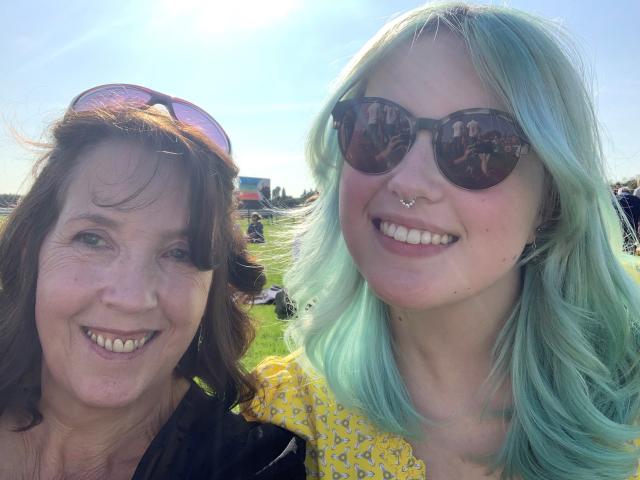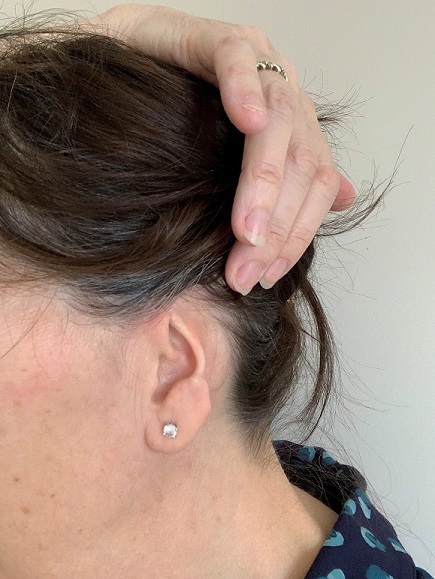
"To be able to put glasses on and them not slip off would make a difference to me"
8 March
55-year-old mum of two, Tina Morgan, from Merthyr Tydfil, was diagnosed with skin cancer on her left ear in 2010. She was on holiday when she had an itch at the top of her ear.
“You know when you’ve got an itch, you’ve just got to scratch it. It became inflamed though and after about three weeks it wasn’t clearing up, so I went to my doctor.
“Initially when I found out it was skin cancer, I was in shock. I’m a lone parent to two children and as the skin cancer was very close to my brain, I was really concerned about my longevity of my life and the impact it could have on them.”
Surgery to remove the cancer was successful but it meant Tina lost the top of her ear and she now only has the lobe remaining.

Pioneering research
Tina visited the world-leading facial reconstruction research programme at Swansea University, meeting the Countess of Wessex, Lead Scar Free Ambassador Simon Weston CBA and Professor Iain Whitaker - who heads up the biggest plastic surgery research group in the UK and Surgical Specialty Lead for Health and Care Research Wales.
The £2.5million RECONREGEN programme is funded by The Scar Free Foundation and Health and Care Research Wales. The three-year initiative is currently investigating pioneering 3D bioprinting of nose and ear cartilage using human cells, as well as the world’s largest study of how facial scarring impacts mental health which could help people like Tina.
Tina would like to have something to replace the part of the ear she’s lost and has previously looked at treatment using cartilage from elsewhere in the body to reconstruct the ear.
“I didn’t really want to have an operation and have any of my rib removed though, so when I saw the research taking place in Swansea, I thought it seemed a more feasible way to help not only me but other people too who are living every day with severe facial scarring. This could change our lives.”
Using human cells
The research is being led by Professor Iain Whitaker - who heads up the biggest plastic surgery research group in the UK - Chair of Plastic Surgery at Swansea University Medical School and Surgical Specialty Lead for Health and Care Research Wales.
The pioneering programme will develop 3D bioprinting using human cartilage specific stem/progenitor cells and nanocellulose (derived from plants) as a ‘bioink’ for facial reconstruction. The project will include scientific studies to determine the ideal combination of cells to grow new cartilage which will lead to human clinical trials for facial reconstruction.
“I have developed the Research Group for the last decade and it has been 6 months since we launched the programme. Following the recruitment of a full complement of staff, our research is really picking up pace,” said Professor Whitaker.
“We are developing the mechanical properties of the bioink and testing the biocompatibility and safety profile for use in facial reconstruction.
“Alongside the tissue engineering and 3D bioprinting research, we are critically analysing the patient pathways in skin cancer management, and with the huge personal, health economic and environmental costs in mind - using cutting edge technologies such as natural language processing and artificial intelligence to revolutionise patient pathways.
“This investment has been revolutionary in catapulting our research efforts forwards with the ultimate aim of offering pioneering treatment options to patients and to recruit further world class researchers into Wales in the very near future.”
Impact on everyday life
“Although I’ve come to terms with what happened, it did take me a while,” said Tina. “I wouldn’t wear my hair up for years after the operation. I think it was only about three summers ago that I felt confident enough to do this.”
Tina was born with a hearing impairment and although she manages without a hearing aid now, she has concerns about not being able to wear one in the future if she needs to.
“I would also like to have something to replace the section of my ear that I’ve lost because of wearing glasses, especially as I get older. I wear glasses for reading and I’m finding I’m wearing them more for doing other things like going to restaurants and cooking. For me to be able to put glasses on and them not slip off would make a difference to me in the longer term.”
Tina used to sunbathe a lot but she’s now very careful about how much time she spends in the sun, and she monitors her skin for any changes or moles.
“If my story helps people to be mindful of how they expose themselves to sunshine then I’m happy to speak out.”